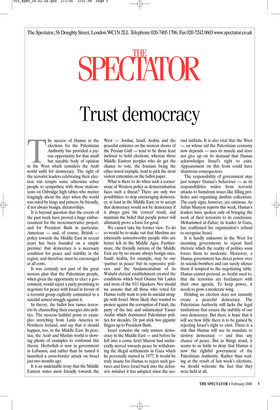Trust democracy
The success of Hamas in the elections for the Palestinian Authority has provided a joyous opportunity for that small but sizeable body of opinion in the West which considers the Arab world unfit for democracy. The sight of the terrorist leaders celebrating their election win tempts some otherwise sober people to sympathise with those malcontents on Oxbridge high tables who mutter longingly about the days when the world was ruled by kings and princes; by friendly, if not always benign, dictatorships.
It is beyond question that the events of the past week have proved a huge embarrassment for the neoconservative project, and for President Bush in particular. American — and, of course, British policy towards the Middle East in recent years has been founded on a simple premise: that democracy is a necessary condition for peace and stability in the region, and therefore must be encouraged at all costs.
It was certainly not part of the great neocon plan that the Palestinian people, when given the opportunity to elect a government, would reject a party promising to negotiate for peace with Israel in favour of a terrorist group explicitly committed to a suicidal armed struggle against it.
In theory, the ballot box tames terrorists by channelling their energies into politics. The neocon faithful point to examples stretching from Latin America to Northern Ireland, and say that it should happen, too, in the Middle East. In practice, the Arab and Muslim world is showing plenty of examples to confound this theory. Hezbollah is now in government in Lebanon, and rather than be tamed it launched a cross-border attack on Israel just two months ago.
It is an undeniable irony that the Middle Eastern states most friendly towards the West — Jordan, Saudi Arabia and the peaceful emirates on the western shores of the Persian Gulf — tend to be those least inclined to hold elections, whereas those Middle Eastern peoples who do get the chance to vote, the Iranians being the other noted example, tend to pick the most violent extremists on the ballot paper.
What is there to do when such a cornerstone of Western policy as democratisation faces such a threat? There are only two possibilities: to stop encouraging democracy, at least in the Middle East; or to accept that democracy would not be democracy if it always gave the ‘correct’ result, and maintain the belief that people power will ultimately prove a force for good.
We cannot take the former view. To do so would be to make out that Muslims are inherently untrustworthy people who are better left in the Middle Ages. Furthermore, the friendly nations of the Middle East are by no means always benign ones. Saudi Arabia, for example, may be our ‘partner in peace’ but its repressive policies and the fundamentalism of its Wahabi clerical establishment created the conditions which bred Osama bin Laden and most of the 9/11 hijackers. Nor should we assume that all those who voted for Hamas really want to join its suicidal struggle with Israel. More likely they wanted to protest against the corruption of Fatah, the party of the late and unlamented Yasser Arafat which dominated Palestinian politics for decades. Or just stick two gigantic fingers up to President Bush.
Israel remains the only mature democracy in the Middle East — and before he fell into a coma Ariel Sharon had unilaterally moved towards peace by withdrawing the illegal settlements in Gaza which he personally started in 1977. It would be truly insane for Hamas to reject such gestures and force Israel back into the defensive mindset it has adopted since the sec ond intifada. It is also vital that the West — on whose aid the Palestinian economy now depends — uses its muscle and does not give up on its demand that Hamas acknowledges Israel’s right to exist. Appeasement on this front could have disastrous consequences.
The responsibility of government may just temper Hamas’s behaviour — as its responsibilities widen from terrorist attacks to humdrum issues like filling potholes and organising dustbin collections. The early signs, however, are ominous. As Julian Manyon reports this week, Hamas’s leaders have spoken only of bringing the work of their terrorists to its conclusion. Mohammed al-Zahar, its leader in Gaza, has reaffirmed his organisation’s refusal to recognise Israel.
It is hardly unknown in the West for incoming governments to repeat hard rhetoric which the reality of politics soon forces them to moderate. Moreover, a Hamas government has direct power over its suicide-bombers and can surely silence them if tempted to the negotiating table: Hamas cannot pretend, as Arafat used to, that the terrorists are freelancers with their own agenda. To keep power, it needs to grow a moderate wing.
Holding an election does not instantly create a peaceful democracy. The Palestinian Authority still lacks the legal institutions that ensure the stability of our own democracy. But there is hope that it will see how little there is to be gained by rejecting Israel’s right to exist. There is a risk that Hamas will use its mandate to destroy democracy — and thus any chance of peace. But as things stand, it seems to us futile to deny that Hamas is now the rightful government of the Palestinian Authority. Rather than wailing at the result of last week’s elections, we should welcome the fact that they were held at all.





























































































































 Previous page
Previous page